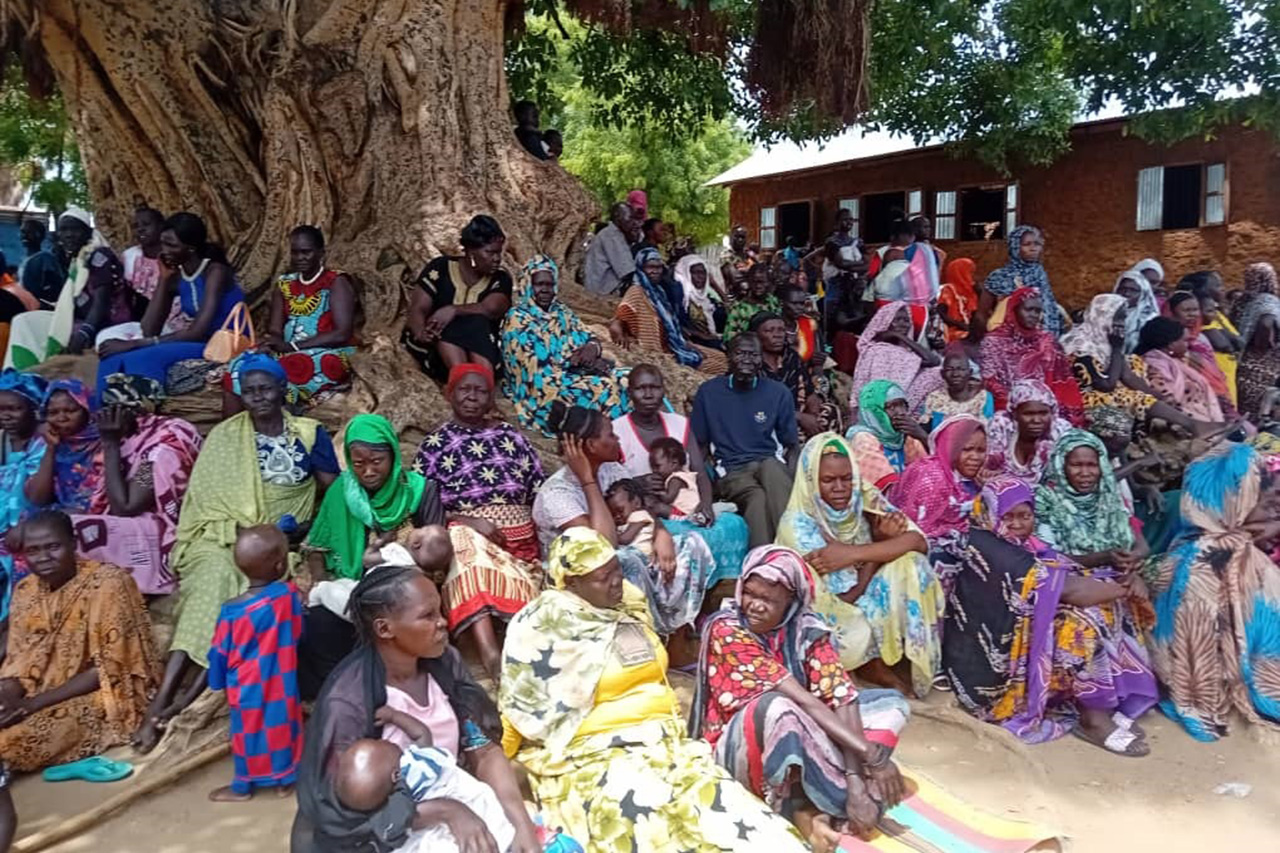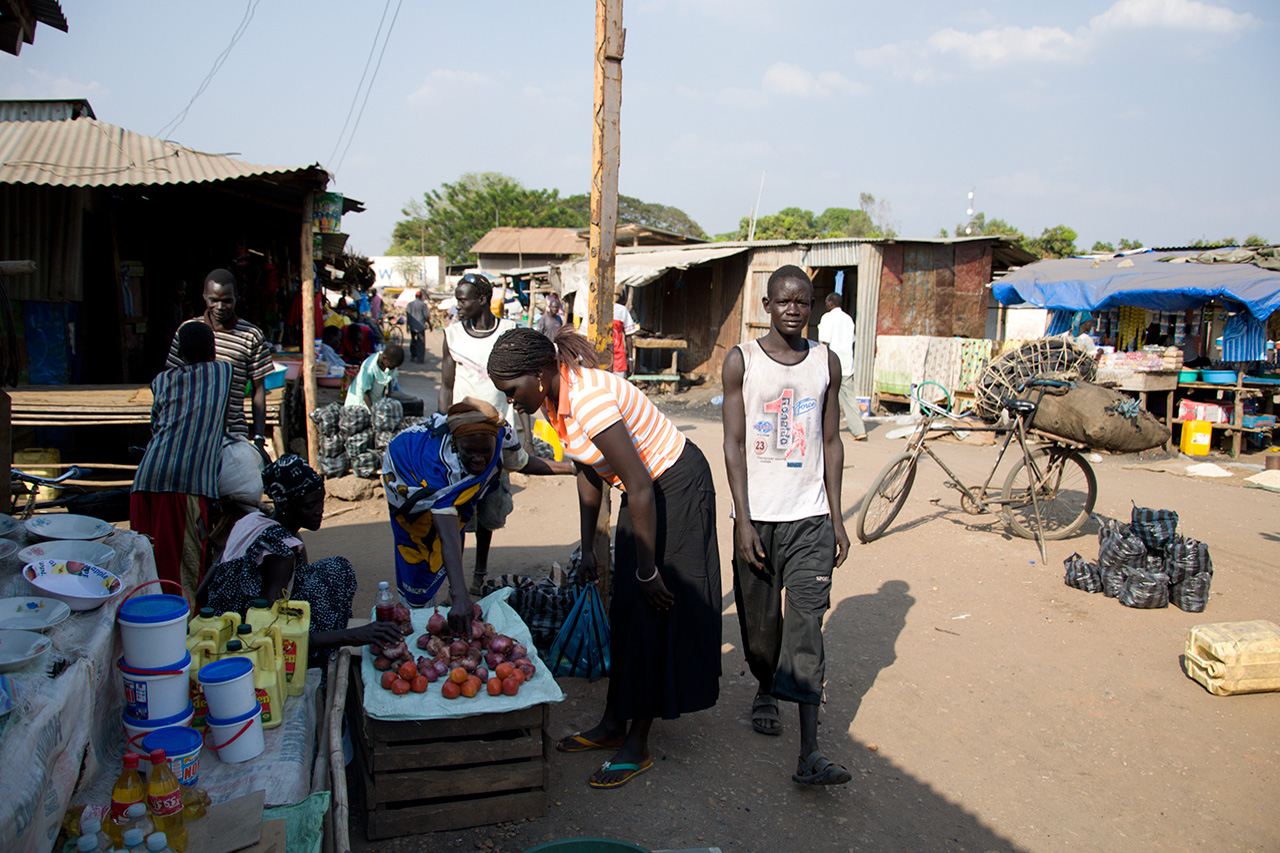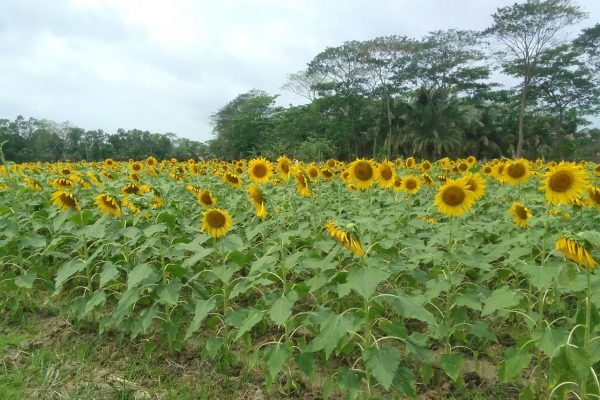From war zone to war zone: Life in South Sudan
Reading Time: 4 minutes
While the world is watching a war unfold in Sudan, a heavy burden of the crisis is being felt in the youngest independent country, South Sudan, where thousands of people are fleeing to, adding to an already overwhelming displaced population.
Over 142,000 people have fled to South Sudan since April 2023, adding to the 300,000 refugees and 2.3 million internally displaced people already living in the country. The UNHCR has declared South Sudan’s refugee crisis as the largest in Africa.
The world’s newest nation is ill-prepared to confront such a significant influx of people alone. Although large-scale conflicts have decreased following the peace agreement in 2018, South Sudan continues to grapple with a complex web of challenges, including ongoing violence and instability, exacerbated by the global economic downturn, the climate crisis, and the persisting Sudan conflict.

Women who have escaped the violence in Khartoum wait for emergency items in a distribution hub in Juba. ©BRAC, 2023.
As more individuals seek refuge within South Sudan, where BRAC has been present since 2007, we’re seeing thousands of people living in already packed informal settlements, at the homes of distant family members, or even forced to shelter on open roads.
No place like home
South Sudanese living in Sudan have been fleeing heavy violence in Khartoum since April 2023 when the conflict broke out. Many left their possessions behind and started walking to the border. Some lost contact with parents or siblings, faced harassment, looting and violence from armed rebels as they undertook a perilous journey through the border town Renk, to reach Juba, the capital of South Sudan.
“Having lived in Sudan as refugees for decades, many have no relatives left in South Sudan, and end up in makeshift settlements. Those who do shelter at their relatives’ homes often do not live in much better conditions either, as their families do not have enough resources to support two sets of families. By June, households in neighbourhoods such as Thongpiny and Gumbo were filled with returnees taking shelter in distant relatives’ homes”, recalls Akib Haider Chowdhury, Programme Support Coordinator for BRAC International’s Asia Region, who was supporting an emergency relief drive in South Sudan for the new returnees.
But coming home has never been harder. Most South Sudanese escaped war in their own country years ago, and fled to Khartoum seeking refuge and a better living. People, especially women, often had multiple informal income streams in Khartoum. They operated tea stalls, salons, and offered child care services during the day, and took on roles such as teaching Arabic to children or offering beauty services in the evenings.
To kickstart their entrepreneurial endeavours in Juba, however, they need more than access to capital. Returnees are facing extreme levels of poverty, having escaped Sudan with next to nothing. International organisations are concentrated around the border areas, such as Renk, providing emergency relief support, however, as people disperse into the capital, facilities and resources are at full capacity. Cramped conditions in camps and homes, limited access to livelihood opportunities and a lack of health and hygiene facilities are giving rise to malaria and waterborne diseases.
Returnees are also confronting severe food insecurity, as is the rest of South Sudan, as prices have surged due to reduced trade with Sudan and poor commercial supplies, resulting in localised food scarcity. The impact of extreme climatic events such as recurrent flash floods and drought in the Horn of Africa, has resulted in two-thirds of South Sudan’s population experiencing livelihood and food insecurity and malnutrition.

A market in Juba. ©BRAC, 2011.
Food, farming, conflict and a changing climate
“Climate-related hazards are becoming common – Eastern Equatoria is a region that is especially vulnerable to floods. We’ve seen heavier rains each year, and the Nile flooding northern regions more frequently, particularly between April to November”, said Aisha Nansamba in April, then the acting country director of BRAC in South Sudan. Livestock losses, now exacerbated by the climate crisis, can increase incidents of cattle raiding, fueling retaliation and leading to intercommunal rivalry.
Repeated encounters with conflict, the return of South Sudanese refugees and internal displacement caused by the climate crisis is putting immense pressure on existing structures in the country, while gradually eroding the ability of households to deal with these crises and rebuild their resources.
Changing this status quo will need long-term approaches that enable people to envision better lives for themselves and their families. For BRAC, which has had a modest relaunch in South Sudan after its independence in 2011, investing in the next generation is one key to achieving that.
South Sudan’s education system has suffered from the prolonged crises, with many people unable to access education at the appropriate age. Parents often face financial constraints to send their children to school, and there’s a lack of essential infrastructure, with many buildings having been damaged from decades-long conflict.
Working in tandem with the government, BRAC in South Sudan worked to support students who had dropped out to re-enter the school system, while simultaneously offering alternative learning opportunities. Life skills and livelihood training were prioritised, particularly for adolescent girls, followed by financial literacy and additional saving and credit services. This enabled a pathway for people to develop marketable skills and earn an income as entrepreneurs.

Learners in a non-formal primary school run by BRAC in Torid, South Sudan. © BRAC, 2009.
Today, education remains a priority across families across South Sudan. While implementing a community-based education module in Northern Bahr el Ghazal and Western Equatoria, BRAC noticed the keen interest families had in schooling. Aisha recalls: “Initially, we aimed to have 33 students per learning centre, but we would often find up to 90 children wanting to be enrolled, pencil in hand, ready to learn. It was encouraging to see such strong interest in education, but accommodating so many students can strain our teachers’ ability to deliver lessons effectively”.
How to rebuild in a post-war setting? According to Aisha Nansamba, it is by investing in human capacity. “It begins by making people aware that they have a choice in shaping which direction their lives take, and ingraining it in people’s mindsets. This lays the groundwork for breaking down existing social barriers”.
For Awut Deng Acuil, the Minister of General Education and Instruction in South Sudan, the influx of refugees has meant looking at resources for an adequate response for the children. “What do we do so that they are not completely disconnected from education? […] We have planned to make sure that we respond to this. And that’s why it is important to have resources to respond to education in crisis, children in crisis”, Minister Awut said in a recent interview, during her visit to BRAC’s education programme in Bangladesh.
“We were refugees ourselves”, she added. “So many South Sudanese have been refugees in different countries [during the civil war], we feel that it is our duty to help”.
The consequences of not acting – for the millions of people who have lived most of their lives in violence, displacement and starvation – are dire. This is especially true for young people, for whom the future holds only potential, should the right opportunities be in place.
Looking forward, investment in South Sudan will need to focus on better preparing communities for the worsening climatic challenges – preparedness to droughts and floods, as well as building resilience in terms of agriculture and other forms of livelihoods. More than anything though, investment needs to be in creating more spaces for learning, so the generation to come knows that even in the most challenging of circumstances, there is always a way to turn things around.
Luba Khalili is Senior Manager, Thought Leadership and Content at BRAC International.





